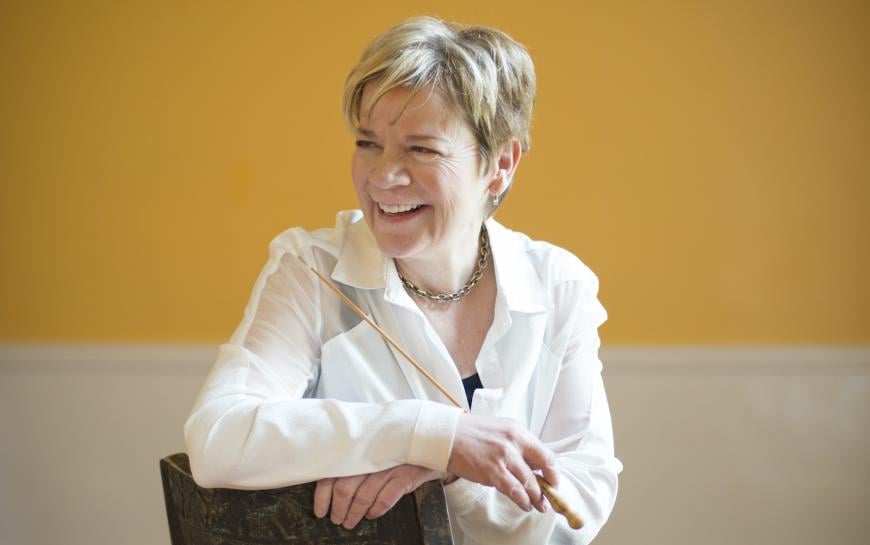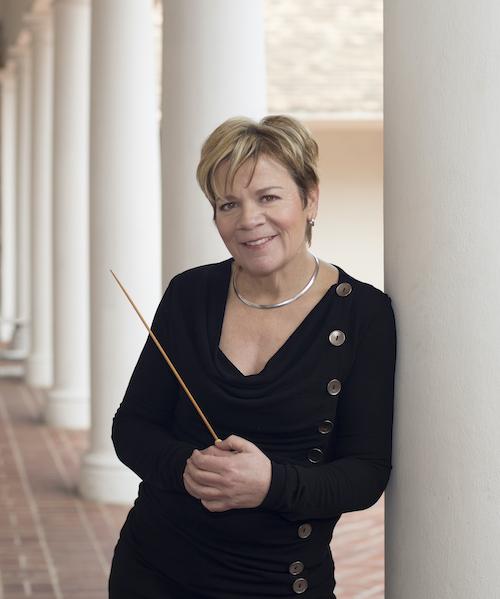
Marin Alsop’s conducting career has been steeped in so many milestones that it’s too easy to look at her career as a symbolic progress, her name a metonym for the mainstreaming and general acceptance of women conductors in the orchestral world.
She was, as her website and dozens of articles in the press proclaim, the first music director of a major American orchestra (Baltimore Symphony Orchestra), and of a Brazilian orchestra (São Paulo Symphony Orchestra), first principal conductor of a British orchestra (Bournemouth Symphony Orchestra) and the first woman to conduct at La Scala opera house and, in 2013, the Last Night of the BBC Proms.
But music lovers in the Bay Area will remember her more for her 25-year tenure (1992–2016) as artistic head of the Cabrillo Music Festival and that’s a far better place to begin appreciating Alsop’s career and her musical breadth. Alsop has conducted 190 (!) premieres of various kinds; 174 of those were at Cabrillo. The festival won the ASCAP award for Adventurous Programming of Contemporary Music every single year under her direction.
That commitment carries into her work with other orchestras: In just 2019, she conducted the world premiere of Helen Grimes’s Percussion Concerto, with Colin Currie and the London Philharmonic, the world premiere of La lame des heures by Jean-Baptiste Robin, with the Orchestre national de France, and Lera Auerbach’s Die Blumen, die niemals blühen werden, with the Vienna Radio Symphony.

Alsop couldn’t be a conductor of worldwide repute without being able to lead the classics, however. Her discography includes cycles of orchestral works by Brahms, with the London Philharmonic and Dvořák’s last four symphonies, with the Baltimore Symphony. But this is a conductor whose recorded legacy is very much tied to the music of now and the past 100 years.
Alsop’s career builds on interests in American music and an appreciation of American jazz she shared with her mentors. She was a student of Harold Farberman in the mid-1980s, then became the first woman to win the Koussevitzky Conducting Prize awarded by the Tanglewood Music Center (in 1989), after which she studied with Leonard Bernstein, Seiji Ozawa, and Gustav Meier. The next year she accompanied Bernstein to Sapporo, Japan and assisted as he founded the Pacific Music Festival.
Professionally she boosted herself by founding the Concordia Orchestra in 1984, going on to the music directorship of the Eugene Symphony (Oregon) in 1989, the Colorado Symphony in 1993, before becoming a star with her appointment as principal guest conductor of the Royal Scottish National Orchestra (Glasgow), with whom she began a recording project of the works of Samuel Barber for Naxos.
OrchKids, her education program with the Baltimore Symphony, the Taki-Alsop Conducting Fellowships, and her stewardship as director of the Peabody Institute’s Graduate Conducting Program are significant, as well. But if you’re looking for good music, not just “significance” here’s are some highlights from an extensive recording catalogue.
Victory Stride: The Music of James P. Johnson (MusicMasters, 1994, rereleased as Johnson: Harlem Symphony on Nimbus, in 2011)
Alsop founded the Concordia Orchestra in 1984, making a number of contacts that keyed projects later in the 1990s. The recovery and reconstruction of the orchestral music of the great James P. Johnson, the composer of “Charleston” and one of New York’s most prominent stride piano players in the 1910s and 20s, was particularly interesting and significant. The tale of finding the manuscripts and putting them together is told in the original liner notes by the pianist on the project, Leslie Stifelman. This is a treasure trove of fantastic music which, if it doesn’t rise to the level of “timeless masterpieces” is still filled with melody and invention. These pieces deserve to be heard.
String Fever: It Don’t Mean a Thing (1998, reissued on Naxos, 2011)
Alsop founded String Fever with a bunch of fellow gigging musicians in 1982 and the band stayed together for 20 years, eventually recording two albums, one of more contemporary jazz and this one of arrangements of classics that everyone has heard of. I’d like to recommend Fever Pitch, also reissued by Naxos, but if you’re faced with the terrible choice of only downloading one, go with the classics.
Barber: Orchestral Works, Vol.1 (Naxos, 2000)
The very first recording in Alsop’s long association with Naxos features the Royal Scottish National Orchestra. It’s just great, and back when CDs were a thing a budget priced recording that included both of Samuel Barber’s symphonies, the First Essay for Orchestra, and The School for Scandal Overture thrown in, with superb performances all round made this release a must-have. The 2010 Gramophone Guide faults the RSNO strings and the acoustics of the hall, but the interpretations still hold up.
Bernstein: Chichester Psalms (Naxos, 2003)
Alsop completed a full cycle of Leonard Bernstein’s orchestral works with the Bournemouth Symphony Orchestra and Chorus, and there are many winners in her interpretations, some of which seem better than the composer’s own. This recording includes the Suite from On the Waterfront, the one original movie that Bernstein scored, and three dance episodes from Bernstein’s first musical On the Town. Michael Tilson Thomas later recorded the full On the Town¸ which is what you go for if you want to hear the whole score in a riotous and well-played rendition, but Alsop’s recording of the Psalms is as good as it gets. Of the Bernstein cycle, you also have to hear Alsop’s complete Mass with soloist Jubilant Sykes, the Baltimore Symphony, and a large contingent of helpers.
MacMillan: The Confession of Isobel Gowdie (LPO, 2008)
The Scottish composer James MacMillan launched his career with this crowd-pleasing, highly dramatic symphonic poem. It’s about a woman accused of witchcraft in 17th-century Scotland, so it isn’t about subtlety and this recording from the London Philharmonic on its house label goes all in on the lurid, Netflix-worthy detail. The playing and the production are superb. The full program of the CD includes Thomas Ades’s Chamber Symphony, his breakthrough work, and Jennifer Higdon’s Percussion Concerto, with Colin Currie as soloist. The performances are fine, if not revelatory. This disc is really all about the MacMillan, though.
Nixon in China (Naxos, 2009)
Rare is the modern opera that has three recordings, but John Adams’s and Alice Goodman’s opera about the historic meeting of President Nixon and Chairman Mao Zedong is a repertory staple now. Alsop has the ability to bring out the rhythmic layering of Adams’s 1980s minimalist scores and this recording with Robert Orth as the president and Marc Heller as Mao and played by the Colorado Symphony, is brilliant. If you want to hear Alsop’s propulsive way with Adams’s music at less than the two-and-a-half hours of this opera, try the Bournemouth Symphony’s account of Shaker Loops along with Nathan Gunn’s superior account of The Wound Dresser. That recording also has the headbanging Short Ride in a Fast Machine.
Anna Clyne: DANCE/ Elgar: Cello Concerto (Avie, 2020)
Cellist Inbal Segev is the star of this recording, doing gorgeous work on the Elgar concerto as well as Anna Clyne’s concerto, which was written for Segev. Clyne is a composer that Alsop has turned to many times during her career and this is one of her most polished and emotional pieces. The London Philharmonic provide excellent support. For more of the Clyne/Alsop connection, check out Masquerade, Clyne’s opener for the 2013 Last Night of Proms. It’s the opposite of the cello concerto, all delight and sociability. It’s on the Mythologies recording with four other rewarding Clyne compositions performed by other orchestras and conductors.
The Conductor (2021)
Bernadette Wegenstein’s documentary has the benefit of extensive behind-the-scenes access. The hour-and-a-half film does a great job of filling in Alsop’s personal history, emphasizing her breaking the glass ceiling. But the best things in the film are the interviews with Alsop herself and the scenes of her teaching the next generation.




